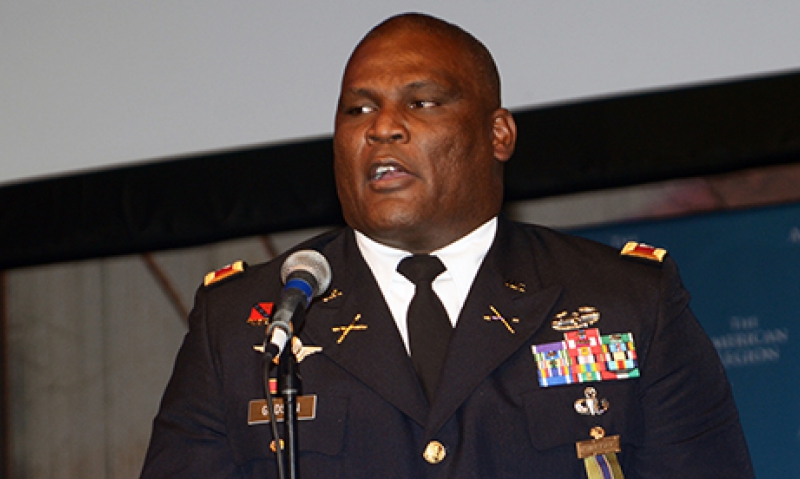
Patriot Award winner beats adversity
The American Legion's Patriot Award, now in its fifth year, is presented to outstanding citizens who perform great deeds and acts of exemplary service. The winner receives a plaque on the floor of the National Convention.
This year's winner, who collected his award in Minneapolis Aug. 30, is Col. Greg Gadson, director of the U.S. Army Wounded Warrior Program (AW2), and a life member of the Legion.
Gadson, like all too many of his fellow soldiers, was severely wounded in Iraq. He lost both legs above the knee and suffered permanent nerve damage in his right arm when he was hit by an IED in 2007. His recovery attracted the attention of many, including the New York Giants, who drew inspiration from him during their miracle run to the Super Bowl in 2008. He chose to take on AW2 rather than retire from the service as a result of his injuries.
He spoke with the Legion between his travels for speaking engagements, prior to leaving for Minneapolis.
Q: What made you decide to go into the military?A: At first, it was the opportunity to play football at Army. But the camaraderie of being a soldier made me stay.
Q: Take us back to the day of the accident. What were your first thoughts after it happened?A: I woke up in an ICU four or five days later. I was pretty disoriented. I hadn't lost my legs yet.
Q: When did you first become involved with AW2? Why did you decide to become director?A: I myself was being assisted by them during my time as an inpatient. It was really a special opportunity to be able to assist in a program that assisted me.
Q: Had you already been a Giants fan? Were you at the Super Bowl?A: I grew up as a Giants fan, mostly because of the defense of the [Bill] Parcells era. I spoke as part of the team speech the night before the game, and I got to be on the sideline during the game and on the field afterward. I still engage with them frequently. You think of being a pro football player as a kid ... I don't know that I ever necessarily crossed it off for myself.
Q: What would you like people to take from your story?A: I would say that you don't often control what life has in store for you. We think we're in control, but we're not. You have to live up to the things that are important to you. You have to give it all, every day.
